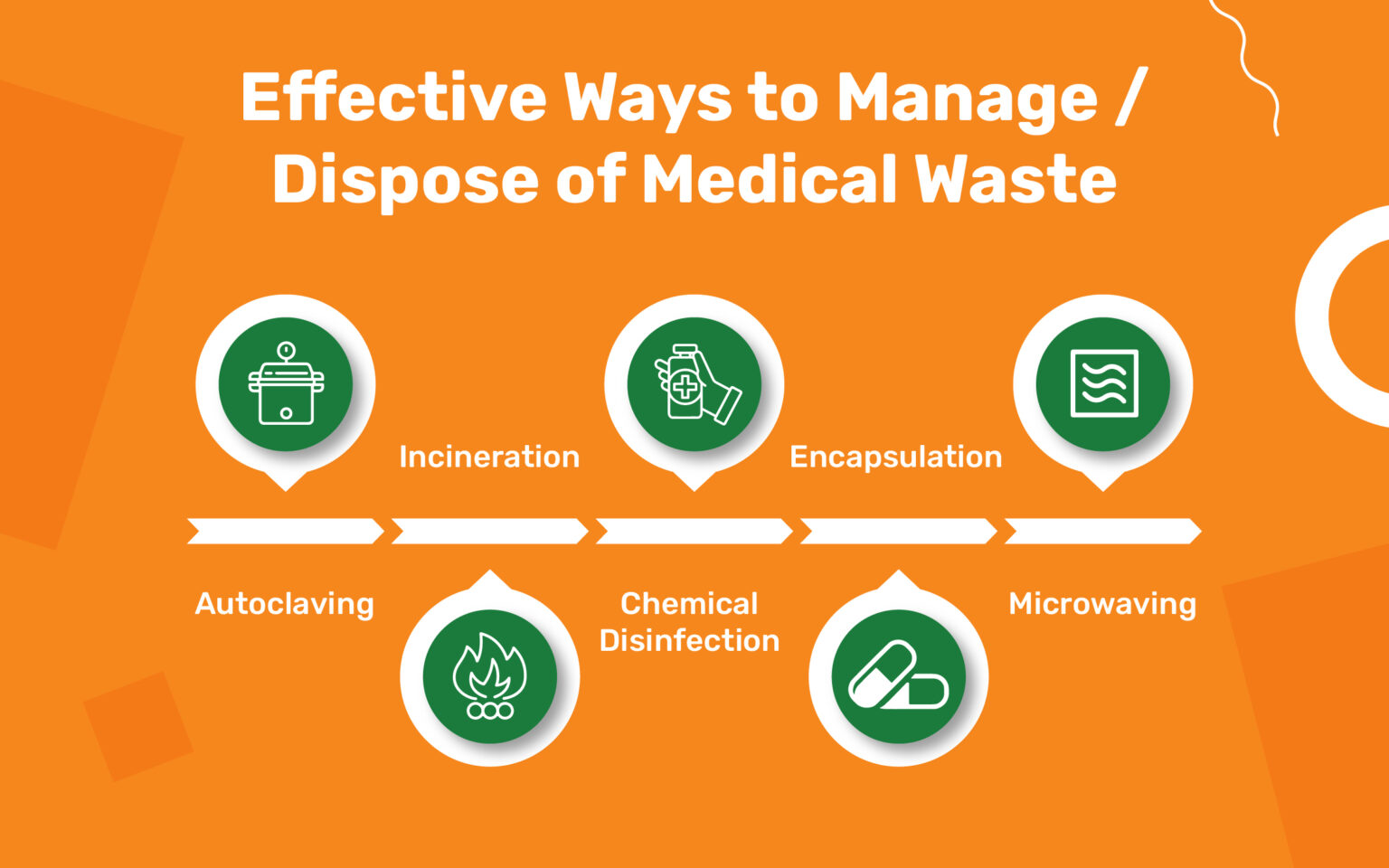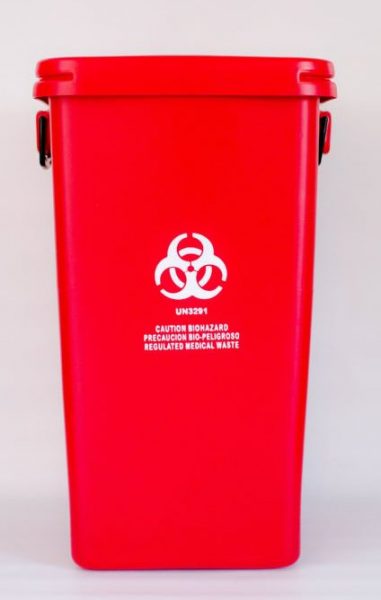Safeguarding Health: Introducing the Significance of Professional Medical Waste Removal
Safeguarding Health: Introducing the Significance of Professional Medical Waste Removal
Blog Article
Keep Ahead of Rules: Professional Guidance on Medical Garbage Disposal
In a world where the health care sector is constantly progressing, it is vital for clinical centers to remain in advance of regulations when it pertains to the appropriate disposal of clinical waste. With rigorous standards and frequent regulatory modifications, it can be challenging to navigate the complexities of this procedure. Nonetheless, with experienced advice, facilities can guarantee compliance and reduce dangers connected with improper waste disposal. From comprehending the various classifications of medical waste to carrying out the ideal collection and partition approaches, this conversation will certainly give workable ideas and useful insights to help centers remain ahead of guidelines in the ever-changing landscape of medical waste disposal.
Understanding Clinical Waste Categories
Understanding clinical waste categories is important for appropriate disposal and management in health care facilities. Medical waste describes any type of waste created by healthcare tasks that may present a threat to public health and wellness or the environment. It is vital to categorize clinical waste properly to ensure its secure handling, transportation, treatment, and disposal.
There are a number of groups of medical waste that health care facilities require to be acquainted with. One of the most common classifications consist of transmittable waste, pathological waste, sharps waste, pharmaceutical waste, and chemical waste. Each category has details standards and laws for its proper monitoring and disposal.
Pathological waste refers to human tissues, organs, or body parts that require special handling and disposal. Drug waste consists of run out, extra, or polluted medications that need careful handling and disposal.
Remaining Up-To-Date With Regulatory Adjustments
Remaining present with regulative modifications is vital for medical care centers to make sure compliance and proper administration of medical garbage disposal. medical waste removal services. With guidelines continuously developing, it is important for medical care facilities to stay current to stay clear of charges, fines, and potential injury to the atmosphere and public health
To remain ahead of regulatory modifications, healthcare centers must establish a system for monitoring and tracking updates. This can be done by signing up for governing newsletters, attending conferences and workshops, and proactively joining sector associations. Furthermore, facilities need to assign an employee or team liable for staying educated and disseminating details to relevant stakeholders.
Normal communication with governing agencies is likewise important. Health care centers ought to develop connections with neighborhood, state, and federal companies to guarantee they understand any kind of changes in guidelines that might impact their waste administration practices. This can be done with normal meetings, involvement in public remark periods, and positive involvement with regulatory companies.
Additionally, healthcare centers should take into consideration partnering with waste administration companies that concentrate on medical garbage disposal (medical waste disposal services with WasteX). These business are usually well-versed in the current laws and can provide assistance and assistance to make certain conformity
Implementing Proper Collection and Segregation Techniques
To efficiently handle clinical garbage disposal, medical care facilities must establish proper collection and segregation techniques in accordance with regulative guidelines. Carrying out these techniques makes sure the secure handling and disposal of potentially dangerous materials, safeguards the environment, and minimizes the risk of infections and injuries to healthcare workers and the basic public.
Correct collection and partition approaches entail making use of marked containers and classifying systems. Medical care centers must supply clearly labeled containers for different kinds of clinical waste, such as sharps, contagious waste, pharmaceutical waste, and non-hazardous waste. These containers ought to be color-coded and clearly significant to stay clear of complication and promote easy recognition.
Furthermore, health care facilities need to educate their personnel on the appropriate procedures for accumulating and segregating medical waste. This consists of informing them on the different sorts of waste, the proper containers to utilize, and the importance of adhering to guidelines and regulations. Regular training sessions and correspondence course should be performed to make sure that team members remain updated on best practices.
Moreover, healthcare centers should develop a system for regular collection and disposal of clinical waste. This may entail partnering with certified waste administration business that specialize in medical garbage disposal. These business will certainly guarantee that the accumulated waste is delivered and gotten rid of in conformity with regulatory demands.
Choosing the Right Disposal Techniques

Incineration is among one of the most usual and reliable methods for getting rid of specific kinds of clinical waste, such as pathological waste and sharps. It entails the regulated burning of waste at heats, lowering it to ash. Incineration can launch harmful pollutants right into the air and add to air contamination.

Other disposal approaches include chemical therapy, microwave treatment, and landfilling. Chemical treatment includes the use of chemicals to decontaminate and reduce the effects of the waste. Microwave treatment makes use of microwave Read More Here energy to warmth and sanitize the waste. Landfilling entails burying the waste in a marked garbage dump location (medical waste disposal services with WasteX). Landfilling needs to be the last hotel due to the potential risk of contamination to soil and groundwater.
Making Sure Conformity With Paperwork and Training
After very carefully taking into consideration the ideal disposal approaches for clinical waste, medical care centers have to make certain conformity with laws and decrease ecological influence by applying reliable paperwork and training procedures. This step is essential in maintaining a safe and sustainable atmosphere for both health care workers and the general public.

Training is similarly important in guaranteeing conformity with regulations. Health care employees that handle medical waste must obtain appropriate training on waste segregation, taking care of, and disposal procedures. This training ought to cover topics such as the correct use personal safety tools, identification of different kinds of waste, and the right disposal approaches for each and every waste category. By offering detailed training, medical care centers my company can encourage their staff great site to make informed decisions and reduce the danger of incorrect garbage disposal.
Final Thought
To conclude, staying ahead of regulations in medical garbage disposal is essential for healthcare facilities. medical waste removal service. Understanding the different groups of clinical waste, staying updated with governing adjustments, applying appropriate collection and segregation methods, picking the ideal disposal techniques, and making sure conformity with documentation and training are all essential actions. By complying with these guidelines, medical care companies can efficiently manage and get rid of of clinical waste in a risk-free and responsible fashion
From comprehending the different groups of medical waste to implementing the ideal collection and segregation approaches, this discussion will certainly offer valuable understandings and actionable ideas to help centers stay ahead of policies in the ever-changing landscape of clinical waste disposal. - medical waste disposal services with WasteX
The most common classifications consist of transmittable waste, pathological waste, sharps waste, pharmaceutical waste, and chemical waste. Healthcare facilities ought to offer plainly classified containers for various kinds of clinical waste, such as sharps, transmittable waste, pharmaceutical waste, and non-hazardous waste. Healthcare facilities ought to establish an extensive system to tape and track all elements of clinical waste disposal, consisting of kinds of waste produced, amounts, and disposal techniques utilized. Health care employees who manage clinical waste must get proper training on waste partition, managing, and disposal procedures.
Report this page